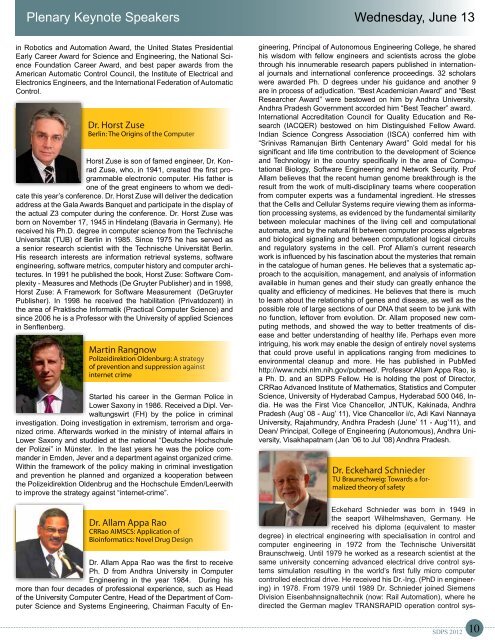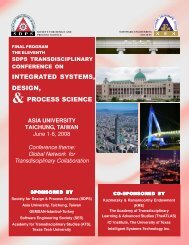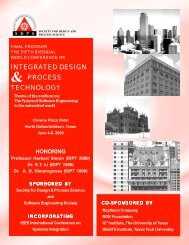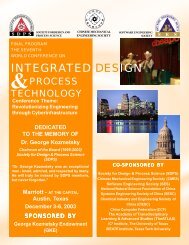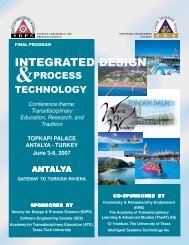Sessions - Integrated Design and Process Technology
Sessions - Integrated Design and Process Technology
Sessions - Integrated Design and Process Technology
Create successful ePaper yourself
Turn your PDF publications into a flip-book with our unique Google optimized e-Paper software.
Plenary Keynote Speakers<br />
in Robotics <strong>and</strong> Automation Award, the United States Presidential<br />
Early Career Award for Science <strong>and</strong> Engineering, the National Science<br />
Foundation Career Award, <strong>and</strong> best paper awards from the<br />
American Automatic Control Council, the Institute of Electrical <strong>and</strong><br />
Electronics Engineers, <strong>and</strong> the International Federation of Automatic<br />
Control.<br />
Dr. Horst Zuse<br />
Berlin: The Origins of the Computer<br />
Horst Zuse is son of famed engineer, Dr. Konrad<br />
Zuse, who, in 1941, created the first programmable<br />
electronic computer. His father is<br />
one of the great engineers to whom we dedicate<br />
this year’s conference. Dr. Horst Zuse will deliver the dedication<br />
address at the Gala Awards Banquet <strong>and</strong> participate in the display of<br />
the actual Z3 computer during the conference. Dr. Horst Zuse was<br />
born on November 17, 1945 in Hindelang (Bavaria in Germany). He<br />
received his Ph.D. degree in computer science from the Technische<br />
Universität (TUB) of Berlin in 1985. Since 1975 he has served as<br />
a senior research scientist with the Technische Universität Berlin.<br />
His research interests are information retrieval systems, software<br />
engineering, software metrics, computer history <strong>and</strong> computer architectures.<br />
In 1991 he published the book, Horst Zuse: Software Complexity<br />
- Measures <strong>and</strong> Methods (De Gruyter Publisher) <strong>and</strong> in 1998,<br />
Horst Zuse: A Framework for Software Measurement (DeGruyter<br />
Publisher). In 1998 he received the habilitation (Privatdozent) in<br />
the area of Praktische Informatik (Practical Computer Science) <strong>and</strong><br />
since 2006 he is a Professor with the University of applied Sciences<br />
in Senftenberg.<br />
Martin Rangnow<br />
Polizeidirektion Oldenburg: A strategy<br />
of prevention <strong>and</strong> suppression against<br />
internet crime<br />
Started his career in the German Police in<br />
Lower Saxony in 1986. Received a Dipl. Verwaltungswirt<br />
(FH) by the police in criminal<br />
investigation. Doing investigation in extremism, terrorism <strong>and</strong> organized<br />
crime. Afterwards worked in the ministry of internal affairs in<br />
Lower Saxony <strong>and</strong> studdied at the national “Deutsche Hochschule<br />
der Polizei” in Münster. In the last years he was the police comm<strong>and</strong>er<br />
in Emden, Jever <strong>and</strong> a department against organized crime.<br />
Within the framework of the policy making in criminal investigation<br />
<strong>and</strong> prevention he planned <strong>and</strong> organized a kooperation between<br />
the Polizeidirektion Oldenbrug <strong>and</strong> the Hochschule Emden/Leerwith<br />
to improve the strategy against “internet-crime”.<br />
Dr. Allam Appa Rao<br />
CRRao AIMSCS: Application of<br />
Bioinformatics: Novel Drug <strong>Design</strong><br />
Dr. Allam Appa Rao was the first to receive<br />
Ph. D from Andhra University in Computer<br />
Engineering in the year 1984. During his<br />
more than four decades of professional experience, such as Head<br />
of the University Computer Centre, Head of the Department of Computer<br />
Science <strong>and</strong> Systems Engineering, Chairman Faculty of En-<br />
Wednesday, June 13<br />
gineering, Principal of Autonomous Engineering College, he shared<br />
his wisdom with fellow engineers <strong>and</strong> scientists across the globe<br />
through his innumerable research papers published in international<br />
journals <strong>and</strong> international conference proceedings. 32 scholars<br />
were awarded Ph. D degrees under his guidance <strong>and</strong> another 9<br />
are in process of adjudication. “Best Academician Award” <strong>and</strong> “Best<br />
Researcher Award” were bestowed on him by Andhra University.<br />
Andhra Pradesh Government accorded him “Best Teacher” award.<br />
International Accreditation Council for Quality Education <strong>and</strong> Research<br />
(IACQER) bestowed on him Distinguished Fellow Award.<br />
Indian Science Congress Association (ISCA) conferred him with<br />
“Srinivas Ramanujan Birth Centenary Award” Gold medal for his<br />
significant <strong>and</strong> life time contribution to the development of Science<br />
<strong>and</strong> <strong>Technology</strong> in the country specifically in the area of Computational<br />
Biology, Software Engineering <strong>and</strong> Network Security. Prof<br />
Allam believes that the recent human genome breakthrough is the<br />
result from the work of multi-disciplinary teams where cooperation<br />
from computer experts was a fundamental ingredient. He stresses<br />
that the Cells <strong>and</strong> Cellular Systems require viewing them as information<br />
processing systems, as evidenced by the fundamental similarity<br />
between molecular machines of the living cell <strong>and</strong> computational<br />
automata, <strong>and</strong> by the natural fit between computer process algebras<br />
<strong>and</strong> biological signaling <strong>and</strong> between computational logical circuits<br />
<strong>and</strong> regulatory systems in the cell. Prof Allam’s current research<br />
work is influenced by his fascination about the mysteries that remain<br />
in the catalogue of human genes. He believes that a systematic approach<br />
to the acquisition, management, <strong>and</strong> analysis of information<br />
available in human genes <strong>and</strong> their study can greatly enhance the<br />
quality <strong>and</strong> efficiency of medicines. He believes that there is much<br />
to learn about the relationship of genes <strong>and</strong> disease, as well as the<br />
possible role of large sections of our DNA that seem to be junk with<br />
no function, leftover from evolution. Dr. Allam proposed new computing<br />
methods, <strong>and</strong> showed the way to better treatments of disease<br />
<strong>and</strong> better underst<strong>and</strong>ing of healthy life. Perhaps even more<br />
intriguing, his work may enable the design of entirely novel systems<br />
that could prove useful in applications ranging from medicines to<br />
environmental cleanup <strong>and</strong> more. He has published in PubMed<br />
http://www.ncbi.nlm.nih.gov/pubmed/. Professor Allam Appa Rao, is<br />
a Ph. D. <strong>and</strong> an SDPS Fellow. He is holding the post of Director,<br />
CRRao Advanced Institute of Mathematics, Statistics <strong>and</strong> Computer<br />
Science, University of Hyderabad Campus, Hyderabad 500 046, India.<br />
He was the First Vice Chancellor, JNTUK, Kakinada, Andhra<br />
Pradesh (Aug’ 08 - Aug’ 11), Vice Chancellor i/c, Adi Kavi Nannaya<br />
University, Rajahmundry, Andhra Pradesh (June’ 11 - Aug’11), <strong>and</strong><br />
Dean/ Principal, College of Engineering (Autonomous), Andhra University,<br />
Visakhapatnam (Jan ’06 to Jul ’08) Andhra Pradesh.<br />
Dr. Eckehard Schnieder<br />
TU Braunschweig: Towards a formalized<br />
theory of safety<br />
Eckehard Schnieder was born in 1949 in<br />
the seaport Wilhelmshaven, Germany. He<br />
received his diploma (equivalent to master<br />
degree) in electrical engineering with specialisation in control <strong>and</strong><br />
computer engineering in 1972 from the Technische Universität<br />
Braunschweig. Until 1979 he worked as a research scientist at the<br />
same university concerning advanced electrical drive control systems<br />
simulation resulting in the world’s first fully micro computer<br />
controlled electrical drive. He received his Dr.-Ing. (PhD in engineering)<br />
in 1978. From 1979 until 1989 Dr. Schnieder joined Siemens<br />
Division Eisenbahnsignaltechnik (now: Rail Automation), where he<br />
directed the German maglev TRANSRAPID operation control sys-<br />
SDPS 2012<br />
10


